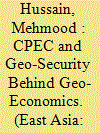| Srl | Item |
| 1 |
ID:
184411


|
|
|
|
|
| Summary/Abstract |
This article analyzes how the structural factor of asymmetry affects China’s relations with a small power. As the studies of Brantly Womack suggest, asymmetry theory is conducive to deepening the understanding of China’s relations with smaller countries. We argue that an examination of China–Philippines relations from 2010 to 2020 indicates that Beijing has trouble managing its ties with Manila because of the asymmetry in the nature of the relations, which originates in the power and status gaps between them. The asymmetrical structure of this bilateral interplay inclines China to underestimate and neglect the Philippines’ intentions and determination to resist, which has been made especially clear in the South China Sea disputes. As a result, their relationship experienced repeated ups and downs throughout the 2010s, in particular over the maritime sovereignty issue. This study also hints at the complicated situations surrounding China where many medium-sized and small states attempt to maneuver among great powers. Without affinities with such governments in the Indo-Pacific region, it will be difficult for Beijing to achieve a peaceful rise and acquire status as a next-generation superpower.
|
|
|
|
|
|
|
|
|
|
|
|
|
|
|
|
| 2 |
ID:
184410


|
|
|
|
|
| Summary/Abstract |
The paper employed a geo-economics approach to investigate the twofold Chinese geopolitical intentions behind the execution of the China-Pakistan Economic Corridor. China financed the CPEC project to overcome energy security and terrorism in Xinjiang. The paper examines the correlation between economic development and security objectives by answering the following key questions. (a) Whether CPEC has the potential to alleviate China’s energy and security dilemma? (b) To what extent CPEC can act as a lever to achieve security interests? The paper argues that geopolitical and geo-security concerns motivate Chinese leadership to use the geo-economics approach. The $65 billion investment in the construction of CPEC has mammoth potential to revitalize the Chinese dream to achieve security through economic and infrastructure development. For Beijing, infrastructure and economic development along the corridor belt would guarantee peace and security in Xinjiang and an overland route of CPEC for energy supplies will circumvent the Malacca dilemma alleviating the threat to the Chinese energy lifeline.
|
|
|
|
|
|
|
|
|
|
|
|
|
|
|
|
| 3 |
ID:
184413


|
|
|
|
|
| Summary/Abstract |
In July 2020, the South Korean government announced a 5-year, post-pandemic plan. This purportedly proactive policy aimed to advance digital and green industries to lay the groundwork for the post-pandemic era. This article examines the South Korean government’s early proposal of a post-pandemic policy, titled the Korean New Deal, in order to explore how the pandemic crisis may affect the policymakers’ envisioning of the post-crisis society. Moreover, the study examines how this early predictive plan may reveal the ways in which the pandemic is utilized for discursive politics. Drawing on the critical discourse analysis of policy documents and news coverage, this article questions how the “old” language of the developmental state is incorporated into the “new” policy. The study also shows how COVID-19′s impacts and uncertainties are translated into political discourses.
|
|
|
|
|
|
|
|
|
|
|
|
|
|
|
|
| 4 |
ID:
184414


|
|
|
|
|
| Summary/Abstract |
An emergency management system is an important part of the current national governance system. Since the establishment of the People’s Republic of China (PRC) in 1949, China’s emergency management agencies have been reformed many times, and the emergency management system has been significantly improved in continuous development. China’s emergency management can be divided into four stages from 1949 to now, forming three generations of the emergency management system. This paper introduces the organizational characteristics of China’s emergency management in four stages, expounds on the main characteristics of the three generations of the emergency management system, and puts forward some key points of improving China’s emergency management system.
|
|
|
|
|
|
|
|
|
|
|
|
|
|
|
|
| 5 |
ID:
184412


|
|
|
|
|
| Summary/Abstract |
The main research question addressed in this paper is the following: What are the consequences of the purge of the communists and their sympathizers for the development of postwar Japanese society during the Allied Occupation (known as the Red Purge)? According to conventional wisdom, the Red Purge was an illegal and unfair suppression regarding the freedom of speech and a threat to the very survival of democracy in Japan. Surveying previous works on the Red Purge demonstrates that not a single work discusses any constructive aspect of the Red Purge. Criticizing this trend in the historiography, Thomas French correctly pointed out that these previous works tended to neglect or undervalue violent and aggressive behaviors of the Japanese Communist Party and its militant policy after mid-1949. This paper goes a little further, trying to find, if any, constructive aspects of the Red Purge. My hypothesis is that the Red Purge had many destructive and biased measures, but it was paradoxically a necessary evil to help establish a law-abiding Japanese society. The architects of the Red Purge, General Douglas MacArthur, Supreme Commander for the Allied Powers, the Japanese government, and corporate executives, were careful not to violate the constitution or labor laws when they executed the Red Purge. They established an important precedent that they had to act in accordance with the constitution and laws. In a paradoxical way, going through the Red Purge actually made Japan a law-abiding country in the long run. This paper tests the validity of this hypothesis.
|
|
|
|
|
|
|
|
|
|
|
|
|
|
|
|